As Kherson floods, one evacuee plans return to aid city’s hardy Jewish holdouts
Tatiana Kovler, a social worker with the JDC who fled rising waters, is in constant contact with clients who have remained in the city despite intense bombings and now flooding
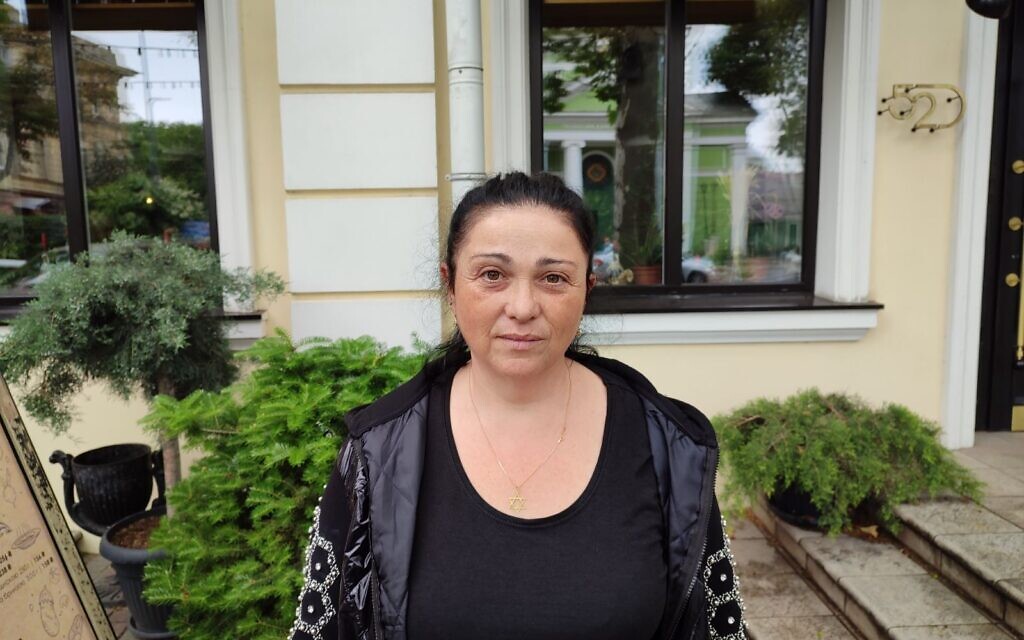
There was no time for emotions, as the water level climbed inside Tatiana Kovler’s home in the leafy southern Ukrainian town of Kherson.
“I just grabbed our documents, our two pet dogs, and got out. I could see the water rise by the minute. I didn’t pause to register my feelings,” Kovler, a 52-year-old social worker and member of the Jewish community of Kherson, told The Times of Israel in an interview from a hotel room in Odesa.
Kovler is one of tens of thousands of Ukrainians and Russians who fled their homes along the Dnipro River following flooding caused by the rupture last week of a major, Russian-held dam, for which the two enemy countries are blaming each other.
Dozens of Jewish residents in the area are among the evacuees, and at least three Jewish groups are involved in efforts to care for those who remained and to find alternative housing for those who did not.
For many locals, leaving Kherson is painful also because it means giving up on their resolve to see the war through there, despite frequent Russian bombings. Some of the area’s remaining Jews had the option to emigrate, but they too stuck around, despite the area being one of the most dangerous locales in the war.
“I was very much afraid for my dogs,” Kovler said of Grom and Helda, two German shepherds that Kovler keeps with her husband, Alexey, a construction engineer. The Kovlers’ son, who is 33, is living and working elsewhere in Ukraine. “They would’ve just drowned if I didn’t take them out to dry land and out of the flooding zone. And this was my decision,” Kovler said, recalling her hurried flight on June 7.
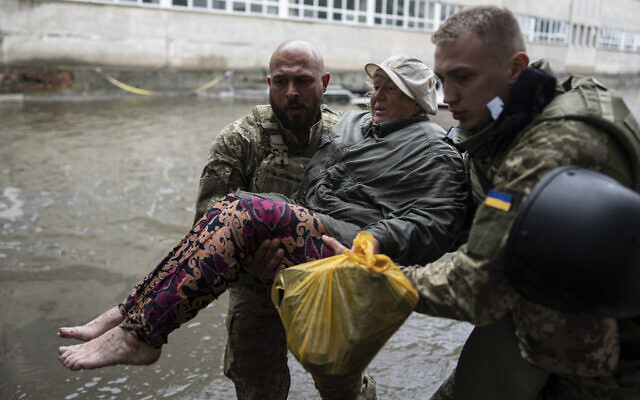
Friends of the family are taking care of the dogs while the Kovlers live in a hotel room in Odesa, which is paid for by Kovler’s employer, the American Jewish Joint Distribution Committee or JDC. A major provider of aid to Jews in the former Soviet Union and beyond, the JDC has employed Kovler since 2008 to assist elderly and other aid recipients, whom the JDC calls clients.
Since Russia began its invasion of Ukraine in February 2022, Kherson was one of the most heavily targeted places in Ukraine. It was the first major city occupied by Russia and the first retaken by Ukraine. Hundreds of civilians and soldiers died in conflicts around Kherson even before the dam ruptured. Recent days have also seen renewed Russian shelling of the city, which killing multiple people.
Through it all, Kovler stayed in her native city, though she could have immigrated to Israel, as more than 16,000 Ukrainians have done since February — five times the tally for 2021.
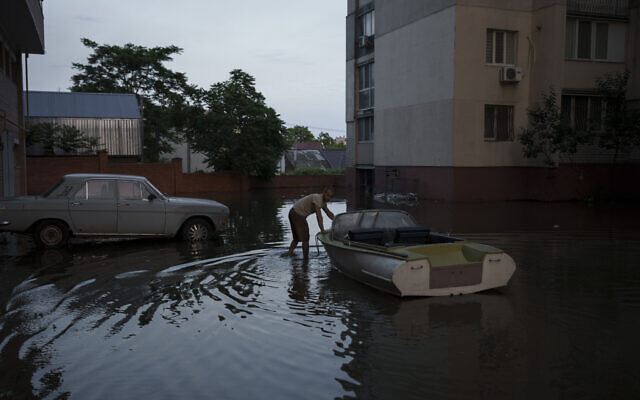
“I stayed because of the clients,” she said, referring to dozens of aid recipients, many of them elderly, who depend on the JDC to make ends meet in a country where the supply of electricity and medicine is frequently disrupted and where the average government pension is lower than $150 a month. “I couldn’t leave those people right when circumstances worsened. They are used to coming to me for solutions they need to survive in dignity. Now, especially, I need to help. I’m waiting to be able to access my home and return.”
The Kherson “Hesed” office – from the Hebrew for “kindness,” the name that JDC uses to denote a center or distribution point of its aid services to needy Jews – has been flooded, though the staff moved files and computers in advance, storing them at the local Chabad synagogue, which is not expected to be affected by the flooding, as it is 20 meters (65 feet) above the water level.
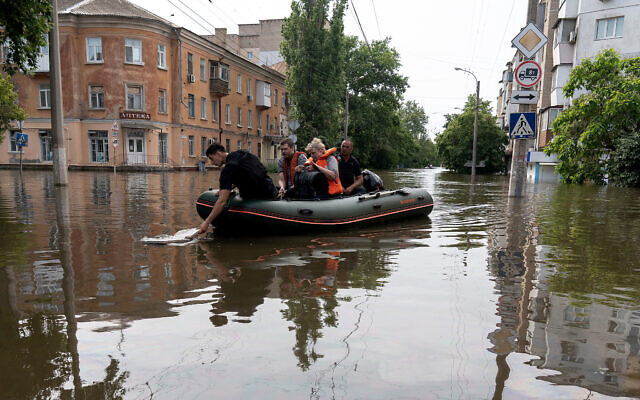
JDC, which this year will receive more than $130 million from the Conference on Jewish Material Claims Against Germany for its care of Holocaust survivors, has some 30 Hesed offices across Ukraine alone, and dozens more, elsewhere in the former Soviet Union.
Hundreds of Jewish families lived in Kherson before Russia’s invasion of Ukraine. Only about 150 of them have remained, according to Israeli-born Rabbi Yosef Wolff, who works on behalf of the Kherson community.
Chabad of Kherson is also providing aid to non-Jews in the flooded city. Rabbi Shalom Ber Stambler in Warsaw, Poland said that he had arranged for several dozen additional Jews to leave for Poland for temporary accommodation.
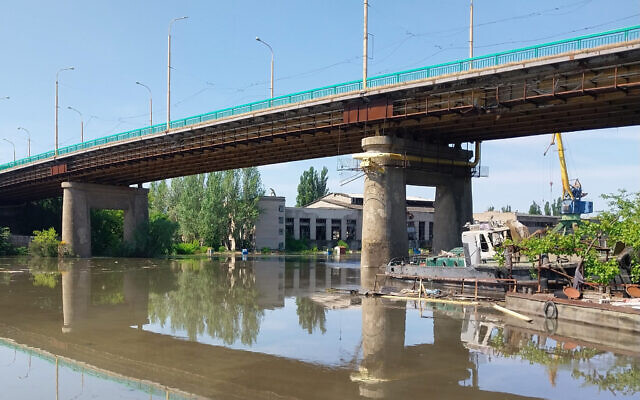
Last year, Kovler’s parents, both Jews, left Kherson for a suburb of Odesa that is considered relatively safe. They had received aid in Kherson and were then transferred to the Odesa Hesed aid office.
“Those who wanted to leave, like my parents, did so before the flooding,” Kovler said. “Those who stayed will stay as long as they possibly can.” She believes that the people’s determination to stay means that Jewish presence in Kherson will prevail.
“If I didn’t believe that, I wouldn’t even consider going back. There’d be no point,” Kovler said about her plan to return to Kherson.
In Odesa, Kovler remains in constant contact with aid recipients under her responsibility. “There are people who need medications, some need hygiene products. Some require diapers, and there’s a small and devoted staff of JDC that’s still in Kherson, making those rounds,” Kovler said.
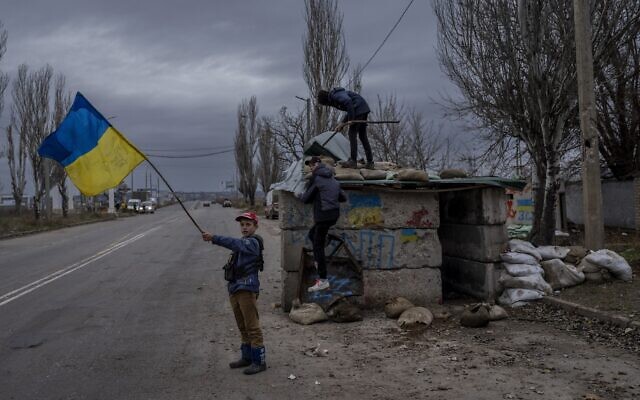
Kovler and her husband do not know the extent of the damage caused to their home, which is currently accessible only by boat. It may be beyond repair. They are also missing their belongings. ”I keep thinking – why did I not take this, why did I not take that? But then I remind myself that I have what’s really important: My husband, my dogs, and the support of the JDC and the community,” Kovler said, her voice quavering with emotion.
Looking forward, Kovler is almost certain that her next step is returning to Kherson as soon as it is relatively safe to do so. “We might end up staying in Odesa, but there are 99 percent who we are returning to Kherson,” she said. We have our lives there, we have our responsibilities there. And if our house is ruined – never mind. We will rebuild.”
There's no paywall on The Times of Israel, but the journalism we do is costly. As an independent news organization, we are in no way influenced by political or business interests. We rely on readers like you to support our fact-based coverage of Israel and the Jewish world. If you appreciate the integrity of this type of journalism, please join the ToI Community.

We’re really pleased that you’ve read X Times of Israel articles in the past month.
That’s why we started the Times of Israel eleven years ago - to provide discerning readers like you with must-read coverage of Israel and the Jewish world.
So now we have a request. Unlike other news outlets, we haven’t put up a paywall. But as the journalism we do is costly, we invite readers for whom The Times of Israel has become important to help support our work by joining The Times of Israel Community.
For as little as $6 a month you can help support our quality journalism while enjoying The Times of Israel AD-FREE, as well as accessing exclusive content available only to Times of Israel Community members.
Thank you,
David Horovitz, Founding Editor of The Times of Israel








